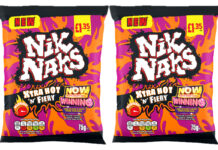Have suppliers begun to use PMPs in ways that could be detrimental to independent c-stores? Scottish Grocer hears the concerns of Bestway Wholesale’s Martin Race.
THE dramatic increase in the use of price-marked packs in independent and symbol group c-stores has been one of the most notable developments of the tough economic times.
Price-marked packs are often praised by suppliers, and indeed by some retailers, as a way to demonstrate value to customers, making them confident they’re getting a good deal. But they were previously used more sparingly as a promotional tool, often signalling a price reduction intended to last for a set period.

The argument was that while they often provided a lower margin, in percentage terms, than standard packs, they still provided a decent cash margin that, when the highlighted promotional price led to increased sales, would ensure it was worthwhile for the retailer.
But recently Bestway, one of the giants of the wholesale scene, has voiced concerns. The firm stresses that it sees great benefits in PMPs when used in a way that benefits all players in the chain. But it’s worried that in a number of categories some suppliers have been offering marked packs with prices that won’t necessarily be attractive to consumers while they offer non-price-marked packs at much higher wholesale prices.
“Cash margin will always be critical for retailers and we need manufacturers to offer a sensible shared margin on PMPs,” said Martin Race, the company’s group trading director. “Manufacturers are now setting retail RRPs by stealth by making price marks ubiquitous as RRP descriptors rather than a promotional tool. This means that in effect they are dictating the margins a retailer makes.
“Not all retailers want to stock PMPs across all categories. If a retailer trades in a city centre like Glasgow – which will invariably mean higher costs – or a tourist centre with little competition, he may not see the need for PMP stock.
“Suppliers will point to the fact that standard non-price-marked packs are available. The problem with this is the pricing of standard stock.
“In confectionery some cases are up to £4 cheaper for a 50p PMP. So for retailers to even make a margin of 20% on standard stock, they would need to sell at 20% above price-mark at around 60p. Considering that the multiples are selling at three for £1, it could be construed that independents are ripping shoppers off when in truth suppliers are not offering the margins to make independents competitive.
“There is also the increasing trend of suppliers asking retailers to offer discounts off of PMPs. This price spiral means that the price-mark no longer signals value but represents the highest price the retailer can charge. If suppliers can discount off the price-mark, why set such an artificially high price-mark in the first instance?
“We are in a worrying stage where if suppliers continue to price-mark irresponsibly across the board, retailers will no longer see price-marking as a benefit to their business and shoppers no longer view it as an indication of value,” he said.





















